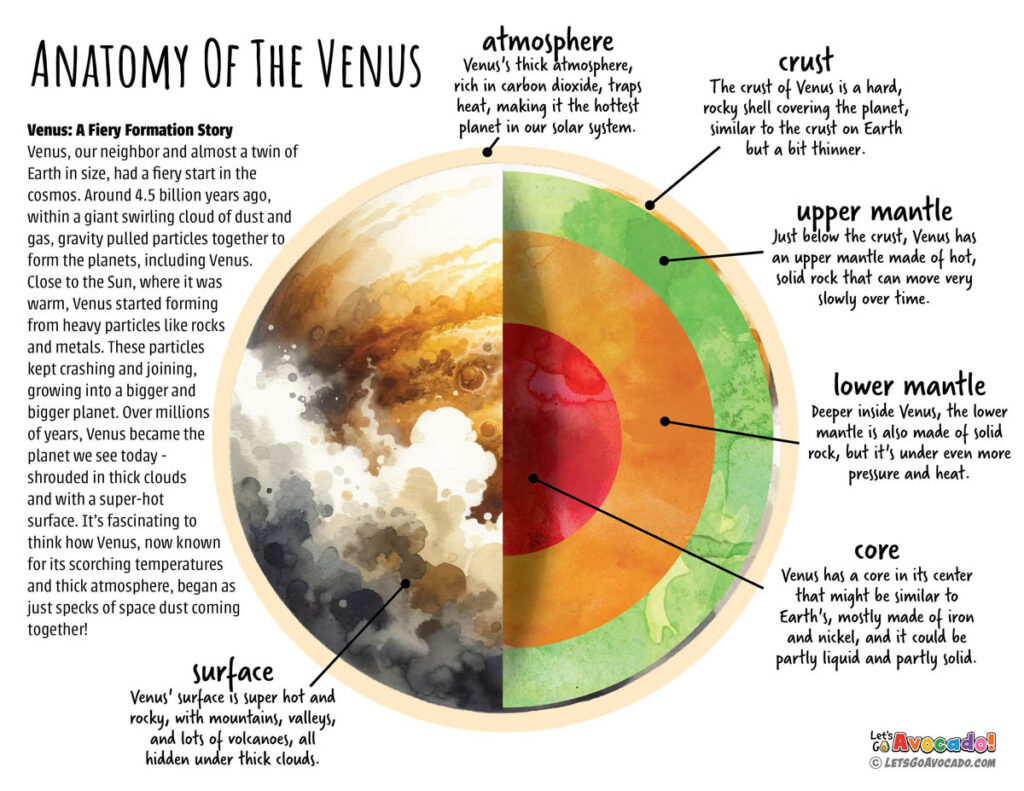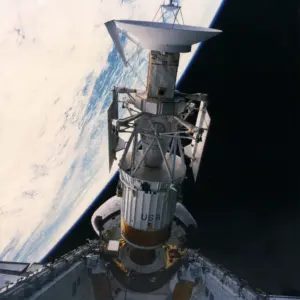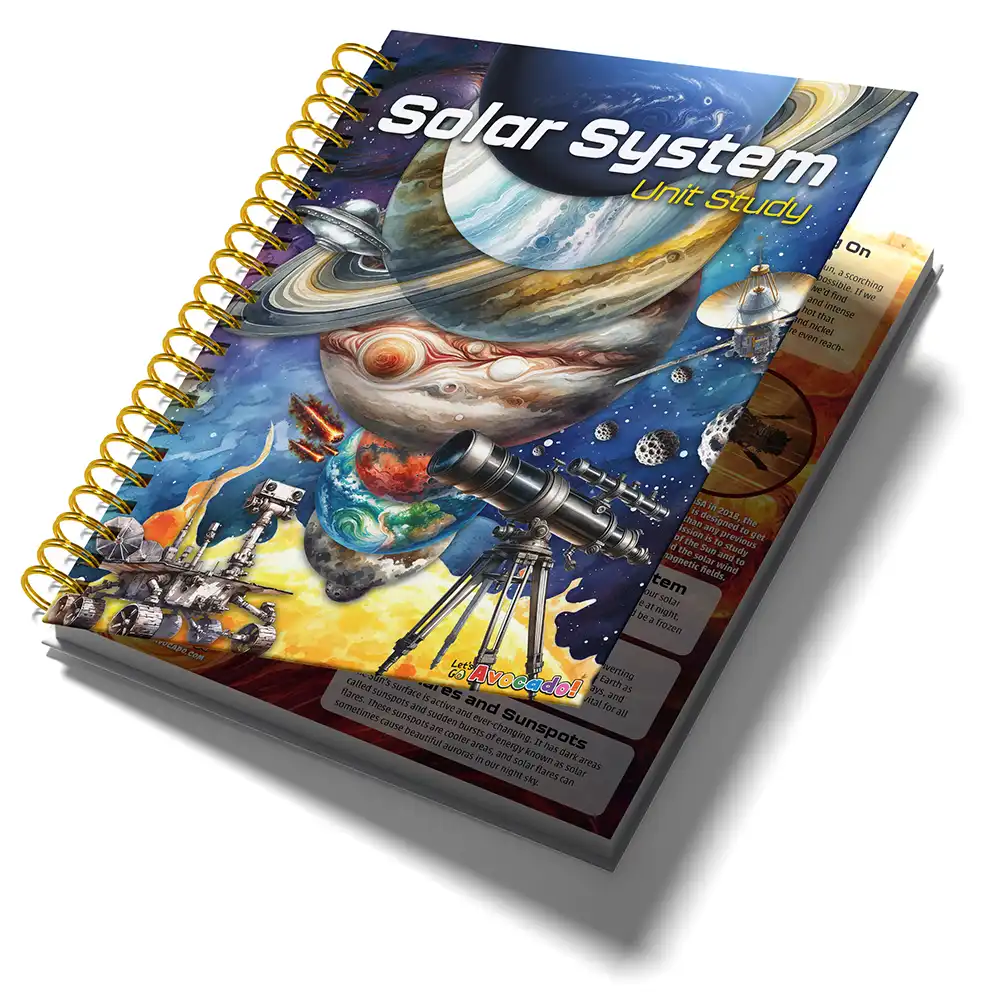This page may contain affiliate links.
Read our disclosure and privacy policy here.
Venus, often called Earth’s sister planet due to its similar size and composition, holds many secrets behind its thick, cloudy veil. One of the most striking facts about Venus is its dense atmosphere, which is primarily made of carbon dioxide, with clouds of sulfuric acid, making it the hottest planet in our solar system despite being the second planet from the Sun. This intense heat is due to a runaway greenhouse effect, a fact that highlights the power of an atmosphere in shaping a planet’s climate. Let’s learn more about this fascinating planet!
Table of Contents
Top 10 Facts About Venus, For Curious Kids!
The Surface of Venus: A Landscape of Extremes
The Structure Of Planet Venus

This anatomy poster is available in our Solar System Study Unit. Check our downloads section for more details.
The Atmosphere: Venus’ Thick Blanket
Venus is wrapped in a super thick atmosphere, much thicker than Earth’s. This blanket is mostly made of carbon dioxide with clouds of sulfuric acid. It’s so thick that it traps heat, making Venus the hottest planet in our solar system. Imagine a winter coat that keeps all the warmth inside on a sunny day!
The Surface: A Rocky and Volcanic Landscape
Beneath the cloudy skies, Venus has a surface covered with mountains, valleys, and lots of volcanoes – more than any other planet we know! Some of these volcanoes might still be active. The surface is rocky and hot enough to melt lead because of the trapped heat from its thick atmosphere.
The Core: The Heart of Venus
Just like Earth, Venus has a core, which we believe is made of iron. Scientists think it could be similar to Earth’s, with a solid inner part and a liquid outer part. The core is what makes Venus have its own gravity, keeping it in place as it orbits the Sun.
The Mantle: Between the Core and Surface
Around the core is the mantle, a thick layer made of rock that can flow very slowly. Even though we can’t see it directly, we know it’s there because of how Venus shakes sometimes, just like Earth does during earthquakes. The mantle is important because it helps shape the surface with its movements.
Venus's Unusual Rotation: A Day Longer Than a Year
Exploring Venus: Missions to the Cloudy World
A World Without Moons
Unveiling the Veiled Planet

Magellan was launched in May 1989, and was the first spacecraft to image the entire surface of Venus.
Why Venus Fascinates Us
Venus in Cultural Mythologies and Folklore

The planet Venus was named after the Roman goddess of love. She was also known as Aphrodite in Greek mythology.
Fun Facts About Venus
- Venus spins backwards: Unlike most planets in our solar system, Venus rotates in the opposite direction of its orbit around the Sun. This means on Venus, the Sun would appear to rise in the west and set in the east!
- Hottest planet: Even though Venus is not the closest planet to the Sun, it’s the hottest because its thick atmosphere traps heat. Temperatures can get up to 900 degrees Fahrenheit, hot enough to melt lead.
- A day longer than a year: A day on Venus (one complete rotation on its axis) takes longer than a year on Venus (one complete orbit around the Sun). This means Venus spins very slowly compared to how quickly it orbits the Sun.
- Volcanoes and lava plains: Venus’s surface is covered with volcanoes and vast plains of solidified lava, showing that it has been geologically active in the past. Some of these volcanoes might still be active today.
- Venus has no moons: Unlike Earth, Venus does not have any moons. It’s one of the two planets in our solar system that doesn’t have a natural satellite, the other being Mercury.
FAQ: 10 Cool Facts About Venus
- What color is Venus?
Venus looks like a bright, yellowish-white star from Earth because its thick clouds reflect the Sun’s light. - Why is Venus so hot?
Venus is super hot, even hotter than Mercury, because its thick atmosphere traps the Sun’s heat, kind of like how a greenhouse keeps plants warm in the winter. - Can we live on Venus?
Living on Venus would be impossible for humans because it’s too hot, has air we can’t breathe, and the pressure on the surface would crush us. - Does Venus have any water?
Venus doesn’t have liquid water like lakes or oceans because it’s too hot; any water would quickly evaporate. - Why does Venus spin backward?
Venus spins in the opposite direction of most planets, which means the Sun would rise in the west and set in the east. Scientists think this might be because of a huge collision long ago or because of how its atmosphere interacts with its rotation. - How long is a day on Venus?
A day on Venus, or one full spin on its axis, takes about 243 Earth days, making it longer than a Venusian year! - What is the atmosphere of Venus made of?
Venus’s atmosphere is mostly carbon dioxide with clouds of sulfuric acid, which is why it’s not a friendly place for humans or animals from Earth. - Has anyone visited Venus?
No humans have visited Venus, but several spacecraft have been sent to study it. They’ve taken pictures and collected data to help us learn more about the planet. - What’s the coolest thing about Venus?
One of the coolest things is that Venus has over 1,600 major volcanoes, more than any other planet in our solar system, and some might still be active! - Can we see Venus from Earth?
Yes, Venus is one of the brightest objects in the sky and can often be seen from Earth just before sunrise or after sunset, which is why it’s sometimes called the “Morning Star” or “Evening Star.”
References
For those eager to dive deeper into the facts about planet Venus , here are some highly recommended resources that offer a wealth of engaging and educational content:
NASA’s Official Website (www.nasa.gov)
NASA’s website is a treasure trove of information directly from the organization leading space exploration in the United States. It offers up-to-date facts, images, and mission information about Venus and other planets. Its content is reliable and written by experts in the field.
The Planetary Society (www.planetary.org)
This website is run by a public space organization dedicated to advancing space science and exploration. It provides detailed articles, engaging videos, and the latest news on space missions, including those studying Venus. The Planetary Society breaks down complex space topics into understandable information for all ages.
Space.com (www.space.com)
Space.com covers a wide range of space-related topics, including astronomy and planetary science. It offers articles that are both informative and accessible, with contributions from space scientists and journalists. The website is regularly updated with news about space discoveries, making it a great resource for learning about the latest findings on Venus and beyond.
These resources are perfect for expanding your knowledge and are sure to spark further curiosity and learning.

There’s a lot to explore right where we are, in our own neighborhoods and backyards! Join us while we get off the couch and explore the everyday wonders of nature, science, space, engineering, art, and anything else we stumble upon during on our adventures.




